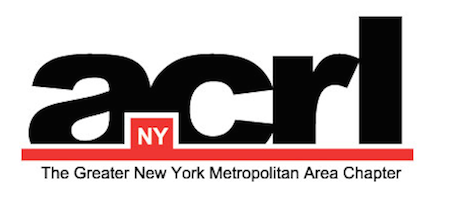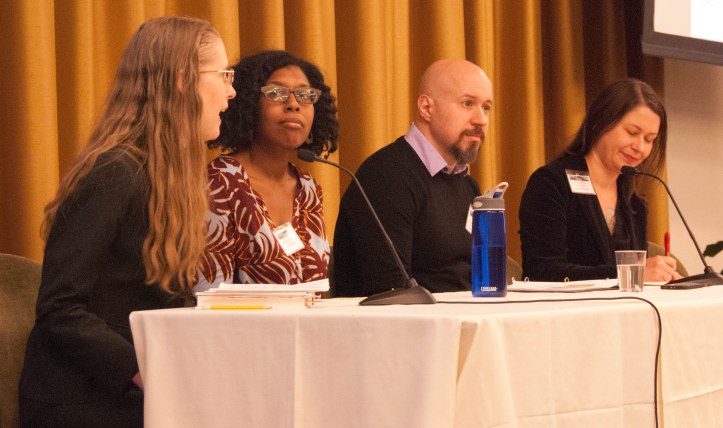The panel discussion “Power, Labor, and Archives,” featured Stacie Williams (Case Western Reserve University), Aliqae Geraci (Cornell) and Jim DelRosso (Cornell). The presenters each discussed the challenges of collection development when powers outside the archive are in control.
Williams’ presentation, “Money, Power, Respect: Archival Labor as a Reflection of Neoliberal Values,” was uniquely framed by the LOX song, “Money, Power, Respect,” which features rap legend Lil’ Kim as the singer of the hook. Williams used Lil’ Kim’s lines to launch her talk because the hook is “the labor that holds up the song” as unpaid labor is the work that bolsters the success of an archive. Williams discussed the ongoing trend of unpaid and underpaid staff and how this impacts the value of archival work. Williams suggested that these staffing practices lead to the continued use of outdated standards and an acquisitions model which reflects colonialist values. Williams argued that archivists should be respected by receiving a fair wage and not left to settle for “love” as payment for services rendered.
In their presentation, “Documenting Dispute: Who is Preserving the Record of Public Sector Collective Bargaining?”, Geraci and DelRosso provided a historical foundation for the development of Industrial and Labor Relations collections across the country. Familiar with the collections of Collective Bargaining Agreements (CBAs) their library maintains for the state of New York and inspired by their search for similar collections in Illinois, they began an analysis of how these materials are managed in other states. During their analysis they found that in many cases CBA collections were wholly inaccessible. To further understand collection efforts,Geraci and DelRosso looked to whether a legal mandate requiring collection impacted these efforts and found that only 12 states had an agency that that considered it their legal mandate to collect CBAs. An analysis of all 50 states found that 27 had at least one state agency collecting CBAs and most of these collections were publicly accessible in some way. The oldest historical collection of CBAs, dating back to the 1960s, was found in the state of New Jersey.
After their presentations, the panel fielded questions from moderator Miranda McDermott. When asked about the future of archival labor history, Williams noted that the strength of a collection containing labor history depends on the collection priorities of those in charge. Geraci noted that the strength of the New Jersey CBA collection at Rutgers University is rooted in the state’s historically strong and supportive relationship with organized labor. Geraci added that if organized labor lacks influence in a state, that will be likely reflected in the archival record.
When asked about funding for collection efforts related to underrepresented groups and communities, Williams stated that while many underrepresented groups may have the means to donate to a collection, there may not be enough financial assistance to support staffing. DelRosso noted that when a project is poorly funded it affects general morale. Williams suggested that instead of taking everything into an archive, more conversations should be devoted to how to treat materials once acquired and making those collections accessible.
Tamara Townsend is a Reference and Instruction Librarian at Long Island University, Brooklyn. tamara.townsend@liu.edu

